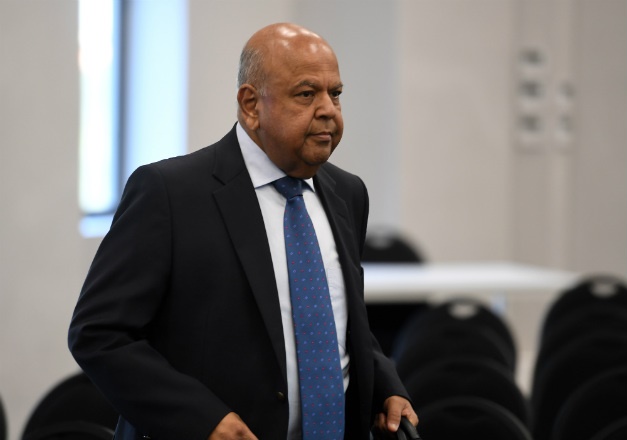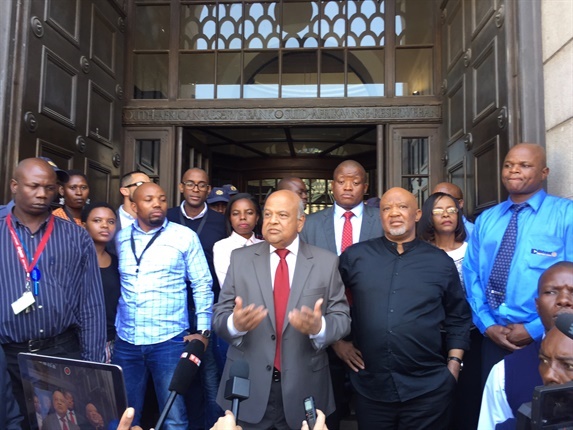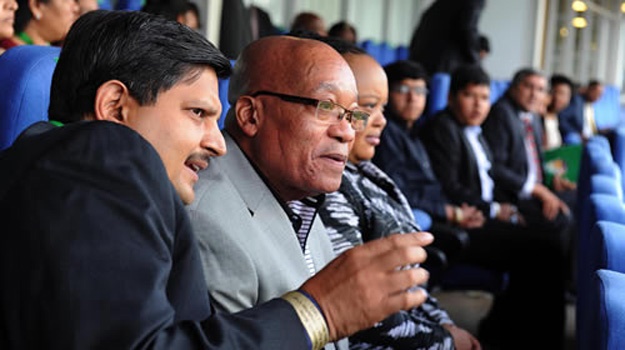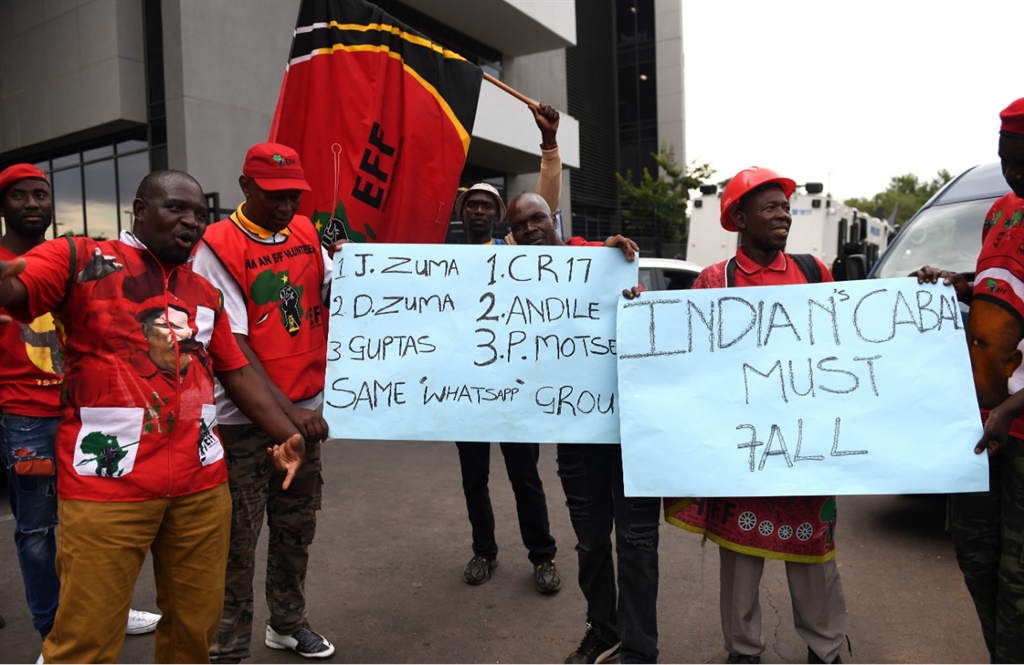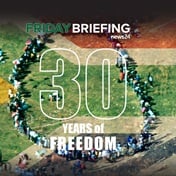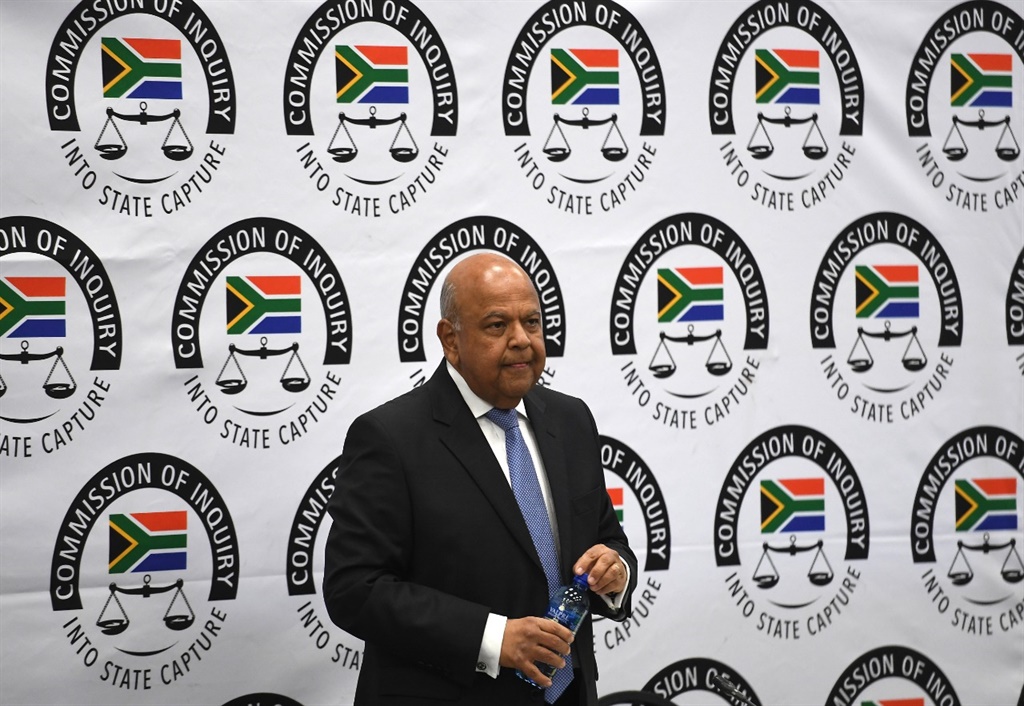
Pravin Gordhan has been the star witness of the state capture commission. He has however suddenly come under attack, much like he was in 2016 and 2017. Why? Pieter du Toit looks for answers.
At lunchtime on Tuesday, during his second day of testimony in front of the judicial commission of inquiry into state capture, Pravin Gordhan seemed pretty chipper.
He had spent the whole of Monday explaining the constitutionally mandated function of National Treasury, the role of the Minister of Finance, the complicated processes around budget-making and the theoretical framework underpinning the phenomenon of state capture.
On Tuesday he started knuckling down into exactly what happened in government during the period of high capture: Nenegate, intimidation and Jacob Zuma. He was in the groove, dovetailing with the commission’s evidence leader advocate Paul Pretorius in detailing his experience of state capture. He is the most senior member of government and the ANC to have testified before the commission.
Outside the building in Parktown, Johannesburg, where the commission sits, the singing and sloganeering of the EFF had gradually begun to grow louder. The party had been protesting outside the venue since Monday, demanding that Gordhan resigns (he is Minister of Public Enterprises) and insisting that he is as crooked as former president Zuma. The former minister of finance – twice! – seemed nonplussed, however.
Gordhan, often portrayed as somewhat humourless and dour, was relaxed and amiable when he walked from the witness stand to the canteen where coffee is served. Before proceedings started he made small talk with the sound engineers. And during his testimony he never raised his voice, sat straight up in his chair and his register remained calm and collected.
He had just testified about the remarkable statement Treasury issued on May 17, 2016 in which he implored the public to come to the defence of the institution. Both Gordhan and Treasury by then were the targets of an orchestrated vilification campaign conceived by now-defunct London public relations firm of Bell Pottinger and Duduzane Zuma, son of the then president. Gordhan told commission chairperson Deputy Chief Justice Raymond Zondo how Zuma was loath to come to his finance minister’s defence. The disinformation campaign seemed to serve his ends.
Gordhan had read part of the statement into the record: "It is particularly painful to me, and I’m sure to many earnest democrats, to witness this unrestrained attack on honest and hardworking people and the institutions meant to strengthen our democracy. Millions of people will pay the price (there will be less money to relieve poverty and support job creation programmes) if this subversion of democracy is left unrestrained and unchallenged.
"I appeal to all South Africans to protect the National Treasury staff, who have diligently, honestly and skilfully served the national interest to the best of their ability. They are recognised worldwide for their professionalism and competence."
The statement was issued after the relentless attacks by the Gupta family’s media arms The New Age and ANN7 (a newspaper and television news station respectively, both now closed) were augmented by a social media campaign and attacks from within Cabinet and the ANC. And when Gordhan was harassed by the head of the Hawks, Berning Ntlemeza, days before he was to table the most difficult budget since 1994, it was clear what the game was.
Gordhan told Zondo the enormous negative impact that the chaotic dismissal of Nhlanhla Nene as finance minister in December 2015 had (the currency weakening, losses on the Johannesburg Stock Exchange, credit rating downgrades) meant that Zuma couldn’t afford to fire another Minister of Finance. "They wanted to chase us from office…" he explained.
The tactic was to make life as untenable as possible so that Gordhan and co. would resign of their own volition. And the president, whose relationship with the finance minister is by far the most important in Cabinet, did nothing. Not even when the Hawks were preparing to lay trumped-up charges.
The statement, issued just after 17:00, was a clear indictment of Zuma. And the mere fact that the finance minister had been forced to issue something of the sort illustrated how deep the animus ran. "It took me one and a half hours to write the statement… at home," Gordhan explained walking to the canteen. "It was a bold step, to issue a statement like that. We (the Treasury management) decided to put everything out into the open, because they (the state capturers) wanted to keep things in the dark. The statement achieved that," he said.
Outside the commission venue the EFF’s singing and dancing grew louder, with red clad EFF supporters carrying placards declaring Gordhan part of an "Indian cabal" and others with the legend "Pravin must go" and "Down with minister Jordaan, the father of the rogue unit". Their leader, Julius Malema, was on his way.
***
When Gordhan exited Treasury’s ministerial offices on Church Square on Friday, March 31, 2017, the country was teetering on the precipice. Zuma’s crude and dramatic dismissal of Gordhan and his deputy, Mcebisi Jonas, was the state capture network’s most audacious and brazen move yet. And Treasury, with its system of checks and cohort of dedicated bureaucrats, had always been the main target. Once you own the keys to the safe, nothing is out of reach.
Gordhan’s return to Treasury was a reluctant one, he told Zondo, as he had just started to turn around the clumsily named department of cooperative governance and traditional affairs (basically, municipalities and tribal areas) and begun making progress in addressing collapsing councils. And when Zuma reappointed him he was surprised.
He spent the following year and a bit trying to right the ship of state, attempting to navigate the treacherous waters of finance and politics amidst the ever strengthening forces of capture. Treasury was attacked from within, with Cabinet ministers Bathabile Dlamini and Nomvula Mokonyane sniping and Nathi Nhleko and David Mahlobo holding press conferences about him. And outside government the Bell Pottinger tactics were paying off: "Gordhan is the tool of white monopoly capital" and Treasury is against "radical economic transformation".
When he was fired he instantly became the face of the resistance and the symbol of the reformist faction in the ANC. And when he addressed a packed Johannesburg City Hall the day after he left Zuma’s government he received a hero’s welcome, effortlessly slipping back into his activist roots.
"Don't now go home and say 'what a nice meeting this was'. Work in your own lives and in your own humble way to bring about change and help create a more resilient democracy. I will say to activists in the alliance, particularly, that now is the time to unite and fight against the weaknesses in our movement and to do everything possible so that the values of Mandela, Sisulu, Tambo and Kathrada are restored," he said to loud cheers from the audience, that included among others Trevor Manuel, Graca Machel, Ebrahim Patel and Willie Hofmeyr.
Before he was restored to Cabinet by President Cyril Ramaphosa, he returned to Parliament as a member of the Portfolio Committee on Public Enterprises where he became the scourge of Eskom. During the committee’s investigation into malfeasance at the parastatel Gordhan was the star attraction, given that he knew where the crooks hid and what they did. There was nowhere to hide for the company’s leadership, or Lynne Brown, the minister responsible for state-owned enterprises. During one meeting she flailed about haplessly as Gordhan exposed his former executive colleague.
Since his appointment as Minister of Public Enterprises he has embarked on an extensive clean-up operation at state-owned enterprises, ground zero of grand capture, replacing boards, dismissing CEOs and initiating forensic investigations. Eskom, Transnet, Prasa, Denel... all bled billions of rands to the Guptas and other patronage networks. Gordhan and his team are cleaning up, even as they sort through the wreckage of Brown’s former department, with documents missing and emails deleted which will make the paper trail difficult to reconstruct. "We’re discovering something new every day," one staffer at public enterprises says.
***
Why then would there suddenly be this assault on Gordhan, given that he was the only senior ANC leader who openly challenged the Zupta network of capture and corruption?
The latest assault started some weeks ago when news reports appeared on obscure news websites and in certain newspapers about Gordhan’s alleged penchant to bully and intimidate. Then questions started floating about regarding a meeting in Stellenbosch between Gordhan, Manuel and businessman Johann Rupert.
But the new campaign started getting momentum when Malema ,without warning, ripped into Gordhan at a press conference, accusing him of all manner of things, including being the mastermind of a new "rogue" intelligence unit engaging in spying activities.
And when his sworn statement to the Zondo commission was leaked the focus immediately fell on his admission that he too met the Guptas. The EFF quickly latched onto that and accused him of aiding the Guptas in their grand project of capture. They followed this up with a three-page list of questions in which they demand answers to questions about his business interests, bank accounts in Canada and his daughter’s professional career.
Not to be outdone, Public Protector Busisiwe Mkhwebane (who used to work in close proximity to Mahlobo, the former spy boss), instructed Gordhan to appear in front of her last week to explain a pension issue while he was finance minister – the same pension issue that was used as pretext to formulate bogus corruption charges in 2016.
And while all of this was happening there was the sudden emergence of noise on social media, with demands that Gordhan should resign because he is corrupt increasing in their frequency and urgency. #PravinMustGo became the call. And the EFF commandeered the old Bell Pottinger slogan of "white monopoly capital".
There is no doubt that the country’s political tectonic plates are again shifting, with new alliances being formed and old enmities being suspended. Gordhan, because of his executive role in cleaning up the state, and the commission, because of its legally mandated role to prise open corruption, have stirred up a hornet’s nest. In the last week we’ve seen Zuma coming out to support Tom Moyane, the butcher of SARS. Moyane in turn is represented by Dali Mpofu, an advocate who also serves as the EFF’s chairperson. And the EFF have trained their guns on Gordhan, Ramaphosa’s chief corruption buster. The chips are beginning to fall.
Many people, seemingly including some in the EFF, have much to lose if Gordhan and the commission take their respective missions to their logical conclusion. The lost decade under Zuma saw rampant malfeasance and billions lost to looting. And in order to derail the Ramaphosa recovery efforts both Gordhan and the commission’s integrity and credibility need to be attacked. Add the dynamics of a looming election and the possible gains to be made by the ANC’s opponents, and the temptation to frame Gordhan as a Zuma stooge becomes irresistible.
***
On Tuesday afternoon, outside the commission venue and shortly after Gordhan concluded his testimony for the day, Malema fired up his supporters by attacking Gordhan, the commission and the media. In what has become typical of Malema’s oratory he insulted and made broad accusations, screamed and laughed, threatened violence and pulled back.
The following day, after the EFF’s supporters were long gone, Gordhan finished his testimony in front of Zondo by quoting both Nelson Mandela and German clergyman Martin Niemöller. He spoke of the valley of the shadow of death, the abhorrence of racism and making principled stands.
Gordhan’s fight is far from over.




 Publications
Publications
 Partners
Partners




